
AMERICAN ANNALS OF THE DEAF
Scope & Guideline
Exploring the Depths of Deafness Research
Introduction
Aims and Scopes
- Deaf Education Research:
The journal emphasizes empirical studies and theoretical discussions related to educational practices for Deaf and Hard of Hearing students, including bilingual education, literacy development, and instructional strategies. - Cultural and Social Perspectives:
A significant focus on the cultural aspects of deafness, exploring Deaf identity, community, and the social dynamics that affect Deaf individuals and their families. - Language Acquisition and Communication:
Research on language development, communication strategies, and the impact of various modalities (sign language, spoken language) on learning outcomes for Deaf students. - Mental Health and Well-Being:
Investigations into the mental health challenges faced by Deaf individuals, including the psychological effects of deafness and the impact of family dynamics on Deaf children. - Policy and Advocacy:
Discussion and analysis of policies affecting Deaf education, rights, and access to resources, including advocacy for equitable practices and inclusion in mainstream education.
Trending and Emerging
- Impact of COVID-19 on Deaf Education:
An increased focus on how the pandemic has affected Deaf education, including shifts to online learning, challenges faced by students and families, and innovative strategies for engagement. - Diversity and Inclusion in Deaf Education:
Emerging discussions around the intersectionality of race, culture, and disability within the Deaf community, emphasizing the importance of inclusive practices and representation in educational settings. - Mental Health Awareness:
Rising attention to the mental health and well-being of Deaf individuals, particularly in relation to parenting stress, social isolation, and the unique challenges faced during the pandemic. - Bilingualism and Multimodal Learning:
A trend towards exploring the benefits of bilingual education (ASL and English) and multimodal approaches to learning, reflecting a more nuanced understanding of language acquisition in Deaf children. - Community-Based Research and Activism:
An increasing number of studies highlight community engagement, advocacy, and activism within the Deaf community, showcasing the voices and experiences of Deaf individuals in shaping educational practices.
Declining or Waning
- Historical Perspectives on Deaf Education:
Research focused on historical methodologies and practices in Deaf education is becoming less common, as contemporary issues and modern pedagogies take precedence. - General Linguistics Outside Deaf Contexts:
Studies that examine general linguistic theories without a direct connection to the Deaf experience or education are appearing less frequently, indicating a shift toward more applied research. - Traditional Medical Models of Deafness:
There is a noticeable decline in research centered on medicalized views of deafness, such as pathologizing deafness or focusing solely on audiological assessments, as the narrative shifts towards empowerment and identity.
Similar Journals

EDUCATIONAL LEADERSHIP
Transforming Educational Practices for Tomorrow's LeadersEDUCATIONAL LEADERSHIP, published by the Association for Supervision and Curriculum Development, is a pivotal journal in the field of education, focusing on innovative practices and theories that shape educational leadership today. Established in 1976, this journal addresses critical issues surrounding curriculum development, supervision, and effective leadership strategies within educational institutions. Although it currently does not offer open access, it remains an essential resource for researchers, educators, and administrators seeking to enhance their understanding of educational dynamics and improve school effectiveness. The journal's impact is underscored by its Scopus ranking, placing it 1017 out of 1319 in the Social Sciences Education category. The absence of a current HIndex in the data indicates an opportunity for further citation engagement and scholarly recognition. Additionally, while coverage in Scopus has been discontinued as of 2019, the legacy of EDUCATIONAL LEADERSHIP continues to influence educational practices worldwide, making it an invaluable asset for those dedicated to advancing the field of education.

International Journal of Sociology of Education
Cultivating a Global Dialogue on Education and SocietyThe International Journal of Sociology of Education, published by HIPATIA PRESS, stands as a pivotal platform for scholars and practitioners in the fields of education and social sciences. Established in 2012 as an open-access journal, it aims to foster a deeper understanding of the interplay between sociological theories and educational practices. With an ISSN of 2014-3575 and a growing reputation reflected in its Q2 and Q3 quartile rankings across relevant categories, the journal is indexed in major databases, ensuring high visibility and citation potential. The journal's Scopus rank highlights its significant standing within the educational and social sciences community, particularly at the 73rd and 83rd percentiles respectively. Based in Barcelona, Spain, it invites contributions that address diverse sociological perspectives and their implications for educational systems worldwide. By providing a collaborative forum for research, this journal not only enriches academic discourse but also serves as an essential resource for policy-making and curriculum development, making it invaluable for researchers, professionals, and students alike.
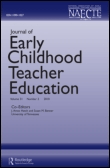
Journal of Early Childhood Teacher Education
Exploring new horizons in teacher education.The Journal of Early Childhood Teacher Education, published by Routledge Journals, Taylor & Francis Ltd, is a premier periodical dedicated to advancing the field of early childhood education. Since its inception in 1990, this journal has become a cornerstone for educators, researchers, and policymakers, providing a forum for peer-reviewed research and innovative practices that support early childhood teaching and learning. With an impressive ranking in the Q2 category of both Education and Social Sciences (miscellaneous) as of 2023, it is recognized for its significant contributions to academic discourse. The journal’s scope encompasses a wide range of topics, including pedagogy, curriculum development, and professional development, making it an essential resource for those interested in improving educational outcomes for young children. While it does not currently offer open access, subscribers and institutions can gain valuable insights through its comprehensive articles. With a commendable Scopus rank and a growing impact in the field, this journal is instrumental in shaping the future of early childhood education.
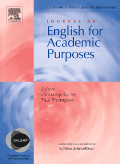
Journal of English for Academic Purposes
Empowering Educators through Language ResearchJournal of English for Academic Purposes, published by ELSEVIER, is a premier peer-reviewed journal dedicated to the study and application of the English language within academic contexts. With an impressive impact factor indicative of its significance in the field, this journal is recognized in the Q1 category for both Education and Linguistics and Language, reflecting its high-quality contributions. It ranks 28th among 1088 in Arts and Humanities (Language and Linguistics) and is featured in the top percentile of Social Sciences. As an essential publication for researchers, educators, and language practitioners, it serves as a platform for innovative research that enhances academic English proficiency and teaching methodologies. With its commitment to exploring the intersection of language and education, the Journal of English for Academic Purposes is a vital resource for those aiming to advance their knowledge and practice in English language education. This journal has been actively contributing to the academic discourse since its inception in 2002 and continues to be influential in shaping the future of English language studies and pedagogy.

TESL Canada Journal
Empowering Educators with Cutting-Edge InsightsTESL Canada Journal, published by TESL Canada, serves as a vital resource for researchers, educators, and practitioners in the field of English as a Second Language (ESL) and applied linguistics. With its commitment to advancing scholarship and best practices in language education, this esteemed journal fosters a platform for the dissemination of high-quality research and innovative pedagogical approaches. Although it operates without open access, its comprehensive articles and reviews offer valuable insights into current trends and challenges faced by ESL educators across Canada and internationally. The journal is dedicated to promoting a deeper understanding of language acquisition processes and instructional methodologies, contributing significantly to the professional development of its readership. Located in Burnaby, Canada, the journal aims to bridge the gap between theory and practice, making it an indispensable source for educators and researchers looking to enhance their expertise in ESL education.

RESEARCH IN THE TEACHING OF ENGLISH
Elevating English Language Instruction via Scholarly ExplorationResearch in the Teaching of English is a premier academic journal published by the National Council of Teachers of English, dedicated to advancing the methodologies and practices in the field of English language education. With a robust ISSN of 0034-527X and e-ISSN of 1943-2348, the journal has carved a niche for itself by consistently presenting cutting-edge research that informs and enhances teaching efficacy in diverse educational contexts. Spanning publication periods from 1996 to 2001 and from 2004 to 2024, it serves as a pivotal resource for educators and researchers. Recognized for its impact, the journal currently holds a Q2 classification in Education and a Q1 in Linguistics and Language, reflecting its significance in academic discourse. With commendable Scopus rankings within the top percentiles in both Arts and Humanities and Social Sciences, it remains an essential platform for scholarly discussion aimed at improving English language teaching methodologies. Join a community of professionals devoted to enriching language education through innovative research contributions.
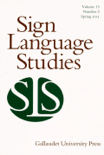
Sign Language Studies
Innovating linguistic studies through sign language.Sign Language Studies is a prestigious peer-reviewed journal dedicated to advancing the field of sign language research and the linguistic studies surrounding it. Published by Gallaudet University Press, this journal stands out in the realms of Linguistics and Language, being classified within the Q2 category as of 2023, which underscores its influence and relevance within academic circles. Operating under the ISSN 0302-1475 and E-ISSN 1533-6263, the journal has a remarkable Scopus ranking that positions it in the top 20% within the disciplines of Arts and Humanities and Social Sciences, attesting to the high quality and impact of its publications. Spanning a comprehensive timeline from 2002 to 2024, Sign Language Studies invites researchers, professionals, and students to engage with cutting-edge research, theoretical frameworks, and practical studies that contribute to our understanding of sign languages, their structure, use, and the communities they serve. This makes it an essential resource for those committed to the exploration and appreciation of sign language within both linguistic and social contexts.
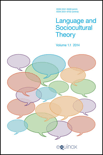
Language and Sociocultural Theory
Decoding the Nuances of Human CommunicationLanguage and Sociocultural Theory, published by EQUINOX PUBLISHING LTD, stands as a vital resource for scholars in the domains of linguistic studies and cultural theory. With its ISSN 2051-9699 and E-ISSN 2051-9702, this UK-based journal has consistently achieved Q1 rankings in both Cultural Studies and Linguistics and Language as of 2023, demonstrating its significant impact within the academic community. The journal's position is further affirmed by its rankings in Scopus, where it occupies the 80th percentile in Cultural Studies and the 72nd percentile in Linguistics and Language, making it a leading platform for cutting-edge research. Though not an Open Access journal, it provides critical insights into the interconnectedness of language and sociocultural dynamics, making it essential reading for researchers, professionals, and students eager to explore the complexities of human communication. Spanning converged years from 2014 to 2023, the journal presents a rich collection of scholarly articles that strive to advance the field and inspire further academic inquiry.

Revista on Line de Politica e Gestao Educacional
Catalyzing Change in Educational Management and PolicyRevista on Line de Politica e Gestao Educacional, published by UNESP-FACULDADE CIENCIAS & LETRAS, serves as a pivotal platform for the dissemination of knowledge in the fields of education policy and management. Established in 2001 as an Open Access journal, it allows for unrestricted online access to research findings, promoting greater scholarly communication and collaboration worldwide. With a focus on educational innovations, policy analysis, and management strategies, this journal aims to foster advancements in educational practices and contribute to informed decision-making in educational institutions. Although it currently does not have an H-index or Scopus rank, its commitment to high-quality, peer-reviewed articles positions it as a valuable resource for researchers, educators, and policymakers alike seeking to enhance their understanding of educational governance in Brazil and beyond. The journal is headquartered at DEPT CIENCIAS EDUCACAO, RODOVIA ARARAQUARA-JAU, KM 1-CAIXA POSTAL 174, ARARAQUARA SP 14800-901, BRAZIL.
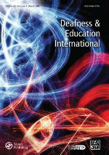
Deafness & Education International
Connecting research and practice in deaf education.Deafness & Education International is a pivotal academic journal that serves as a vital resource for researchers and professionals in the spheres of education and audiology. Published by ROUTLEDGE JOURNALS, TAYLOR & FRANCIS LTD, this journal focuses on interdisciplinary research pertaining to deafness and the linguistic, educational, and emotional needs of individuals who are deaf or hard of hearing. With an ISSN of 1464-3154 and e-ISSN 1557-069X, it covers a vast range of topics, making it an essential tool for advancing education and practice in this field. As of 2023, the journal holds a respectable Q2 ranking in both the Education and Speech and Hearing categories, highlighting its impact within these disciplines. Although it is not an Open Access journal, its comprehensive research articles and evidence-based practices contribute significantly to the ongoing discourse surrounding deafness and education. With the data gathered showing its converged years from 1999 to 2024, readers can expect to find a wealth of knowledge spanning two decades, which is crucial for anyone dedicated to improving the educational outcomes for deaf and hard of hearing students.